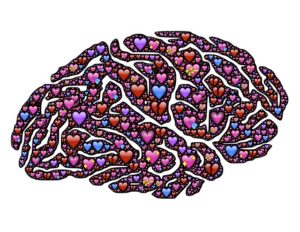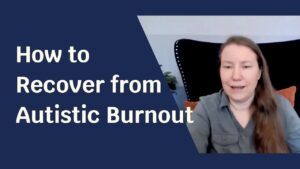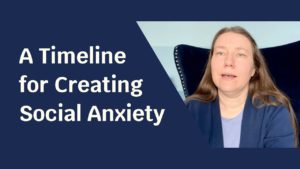What I’m writing here flies in the face of much “conventional” thinking about autism. Instead, it comes from the accounts of many non-speaking autistics themselves, and a little of my own experience.
By the way, the ‘non-verbal’ autism community is beginning to prefer the term ‘non-speaking,’ because they do have language—verbiage—they just can’t speak it, so I will use that term.
Two Types
As far as I can tell, there are actually two different types of non-speaking autism.
Let me try to describe what they look like, first, and then I’ll get to why they are different.
The first type are generally labeled with a severe intellectual disability, and often have difficulty with self-care activities like dressing themselves. They are often impulsive, for example, grabbing things when they shouldn’t. If you tell them to point to the red car, they’ll point to the black one half the time, or to neither.
The second type generally have less difficulty with self-care, can point to the right color or item, but still don’t speak. They are more likely to be labeled with a moderate intellectual disability. Some people in this group do begin speaking at some point, but before that happens, there is no way to know if it ever will or not.
I think there’s something completely different going on.
Both types experience frequent meltdowns or shutdowns, often have chronic GI issues, are often uncooperative at exactly the worst times, are often defiant or angry, often have unusual sleep patterns or sleep disturbances, and their parents definitely don’t get enough sleep.
From the outside, it may look like the biggest difference between the two is the degree of the intellectual disability.
I disagree.
I think there’s something completely different going on.
And I don’t think there’s any intellectual disability in either group. Of course there are individual exceptions, though mostly where there may be co-occurring conditions.
What I think separates these two groups is the cause of why they don’t speak.
The first group
In the first group, these individuals can generally hear and understand everything that’s going on around them. (Yes, they understand what you’re saying about them.) They know perfectly well which is the red car, they know what they’re supposed to do, they just can’t do it.
Their brain and body aren’t communicating efficiently or reliably…
What’s happening here, is a motor control issue. Their brain and body aren’t communicating efficiently or reliably, so they may be looking at the red car and tell their hand to raise and point in that direction, and their hand does something else entirely. Or doesn’t raise at all.
They find this extremely frustrating (I absolutely would, too), which leads to a great deal of anger.
Coupled with being so dramatically misunderstood at every turn, plus a body whose sensory stimulation is overwhelming and often painful, and of course they act out, are defiant, stressed, and chronic stress leads to all sorts of health issues, including, especially, GI issues.
Being unable to speak and being unable to think are two entirely different things.
Here are some accounts by kids and adults with this type of non-speaking autism, who have learned to communicate through alternative methods and have shared their stories with us:
- Ido in Autismland
- Ido’s Autism Experience Challenge
- Carly’s Café
- A Letter to My Body
- Wretches & Jabberers
- Documentaries, movies and television featuring individuals who type or use letterboards to communicate
- Payam on the Power of Belief
So how did they learn to communicate? Many used the Rapid Prompting Method developed by Soma Mukhopadhyay. There are a couple of similar methods, and essentially they all use a letterboard or typing device and teach the individual to point to letters or tap a keyboard to spell out their thoughts.
That involves learning to point reliably, which is a motor skill that can be developed, if the autistic person’s team knows that is something that needs to be worked on.
The instructors who teach the RPM method do work on this, and many individuals have found great success, and it opens up their world to expressing what they need and want and hope and dream!
The second group
On to the second group I described. These individuals, I believe, do not speak because of intense, overwhelming, stress.
Their sensory overwhelm is often extreme, and/or how their brain process incoming information may be challenged, so that the only way their system can cope with it is to clam up. That’s not a particularly scientific description, I know, but there is scientific basis to stress-induced selective mutism.
When these kids are little, the sensory overwhelm is so intense that they don’t begin to speak at the normal age, which worries their parents, who try interventions that don’t address the actual problem, which means that they aren’t going to work, so everyone around these kids is more stressed, which adds to the kids’ already intense overwhelm, and it becomes a bad cycle in which everything just gets harder and harder.
At some point, years down the road, their nervous system might adapt enough to the sensory environment, or the way they process information improves, or something else could change for the better, and reduce the stress enough that they can begin to talk. Yet they still might have non-speaking periods off and on.
…it becomes a bad cycle in which everything just gets harder and harder.
I was a good candidate for being in this group. When I’m intensely stressed out, I stop speaking. I’m not being defiant, attention-seeking, manipulative, stubborn, or rude. I want to talk. I simply cannotspeak. And there is nothing I can do to force the words out. The more I try, the worse it gets. I just have to calm myself down and wait for it to go away.
My sensory overwhelm as a small child was intense. I screamed through my first several months of life, with no medical reason that anyone could find. My sensory defensiveness has always been pretty high, and I’m convinced that if I had grown up in any other household, with any other parents, I would have been in this second group of non-speaking autistics.
But my parents were both quiet people who lived quiet, low-drama lives, and I had no siblings, and I was able to speak most of the time. In fact, I was a highly articulate child. Yet when things got too much, I would shut down, and be unable to speak for periods.
That’s still the case, though I’ve gotten much better at knowing what I need, and what will push me over the edge, so I’ve set up my life and work to keep me healthy and talkative most of the time.
And when something does drive up my stress level, I’m better at recognizing it, and calming myself, so those periods of mutism are much shorter.
That’s what I hope for your child. If you would like, we can work on how to develop this together.
Here are some accounts by adults with this kind of autism who were non-speaking for much of their childhood years:
The bottom line
The bottom line, is that there is no intellectual disability present in either case. For the one, it is a motor impairment, and for the other, it is overwhelming stress (usually sensory or information processing).
So why are they labeled as intellectually impaired? Mostly it is a bias of the system that doesn’t have a way to evaluate alternative means of communication, and doesn’t even look for alternatives.
To be fair, the behaviors that can be seen are often confusing and unpredictable, yet many parents have the gut feeling that there’s more to their kid than what they can express.
Parents may feel intimidated by all the experts and professionals who say otherwise, but often they know that there’s more inside their kid.
This is my current understanding of the world of non-speaking autism. If you’d like to learn more from others I trust, here’s a collection of links that might be helpful. I continue my thoughts in Part 2, in which I’ll discuss six ways to help.




